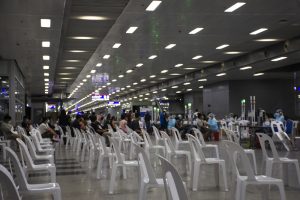As the COVID-19 crisis worsens across most of Southeast Asia, tensions between government authorities and burned out health care workers are threatening to push already fragile health systems to breaking point.
In several Southeast Asian nations, health care providers calling for stronger job security, more equity in access to health services, and better protection against more infectious variants of the coronavirus, have put governments on the defensive.
In Malaysia, which has one of the region’s highest per capita infection rates, police have opened investigations into medical staff for their recent show of support for the “Code Black” and “Black Monday” online campaigns that highlighted the plight of young contract health care workers seeking permanent posts in government.
Unions representing the country’s health care professionals have expressed concerns. The Malaysian Medical Association, which organized the digital movement, has condemned the police probe, calling it “unnecessary” and a form of “harassment” to a simple solidarity drive.
Public health workers under gag orders have also been warned against making unauthorized comments and to be more ethical so as to not be critical of government decisions and policies when using their personal social media accounts.
In recent weeks, doctors and nurses, who are at the forefront of the virus battle, have written open letters, given oral accounts, and shared videos of overcrowded hospitals anonymously as underequipped medics grapple with a surge in patients infected with the Delta variant of COVID-19.
“If there is adequate evidence to prove that officials under the ministry have violated these rules, disciplinary actions, including dismissal from work, can be taken for disobeying orders and affecting the image of the public service,” according to a circular issued by the health ministry.
In neighboring Indonesia, which has become the new epicenter of the pandemic in Asia, health workers are worried about their own immunity after local media reported nearly 1,000 of their peers have died from COVID-19 despite being fully inoculated with Sinovac’s vaccine.
Rising infection rates among doctors, nurses and other frontline workers have also multiplied the patient load on those left standing.
Amnesty International previously called for governments to be held accountable for the deaths of health and essential workers who they have failed to protect from COVID-19.
The U.K.-based human rights organization has also documented cases where health workers who raise safety concerns on COVID-19 response have faced retaliation, ranging from arrest and detention to threats and dismissal.
Indonesia has reported a total of 2.8 million COVID-19 infections and over 73,800 deaths since the start of the pandemic. The government recently said it has prepared backup medical facilities for a worst-case scenario should the daily caseload exceed 100,000 per day.
However, its immunization rate remains low: the archipelagic state has fully vaccinated less than 6 percent of its 270 million population despite having started inoculations in January.
Over in Myanmar, an aggressive crackdown on dissent following the military’s February 1 coup have disrupted access to health care amid a disastrous rise in COVID-19 cases.
Public anger at the military and fear of being seen as cooperating with the regime, has pushed many doctors and patients away from military-run hospitals.
Thousands of doctors have joined the nation’s civil disobedience movement which has seen public employees and other state officials refusing to work under the military regime.
Military troops have attacked striking health care workers, blocked aid, and seized medical equipment and drugs from makeshift clinics during raids. Security forces have also beaten, arrested, and killed medical workers as it declared them “enemies of the state.”
Bridget Welsh, honorary research associate at the University of Nottingham Asia Research Institute-Malaysia, said that as governments across the region fail in managing COVID-19, they are especially hard on those they need the most: doctors.
“That doctors are speaking out at all is telling of how serious the region’s crisis is,” she told The Diplomat. “Myanmar has had the harshest response, in fitting with the crimes-against-humanity junta. In Malaysia, the failure to support younger doctors properly has seriously undermined the COVID-19 effort and is cutting off the oxygen to the development of the health system as a whole.
“Those pointing out shortcomings are punished, which reflects insecurity and reaffirms the need for new leadership in health management,” Welsh said.
Governments seeking to contain the spread of the COVID-19 virus will need the support of all of its health care workforce in the long haul as the pandemic shows no signs of easing. But as many more succumb to the disease, the enduring few are left exhausted, broken, and angry. And mistrust in governments will only lead to the collapse of entire health care systems.

































